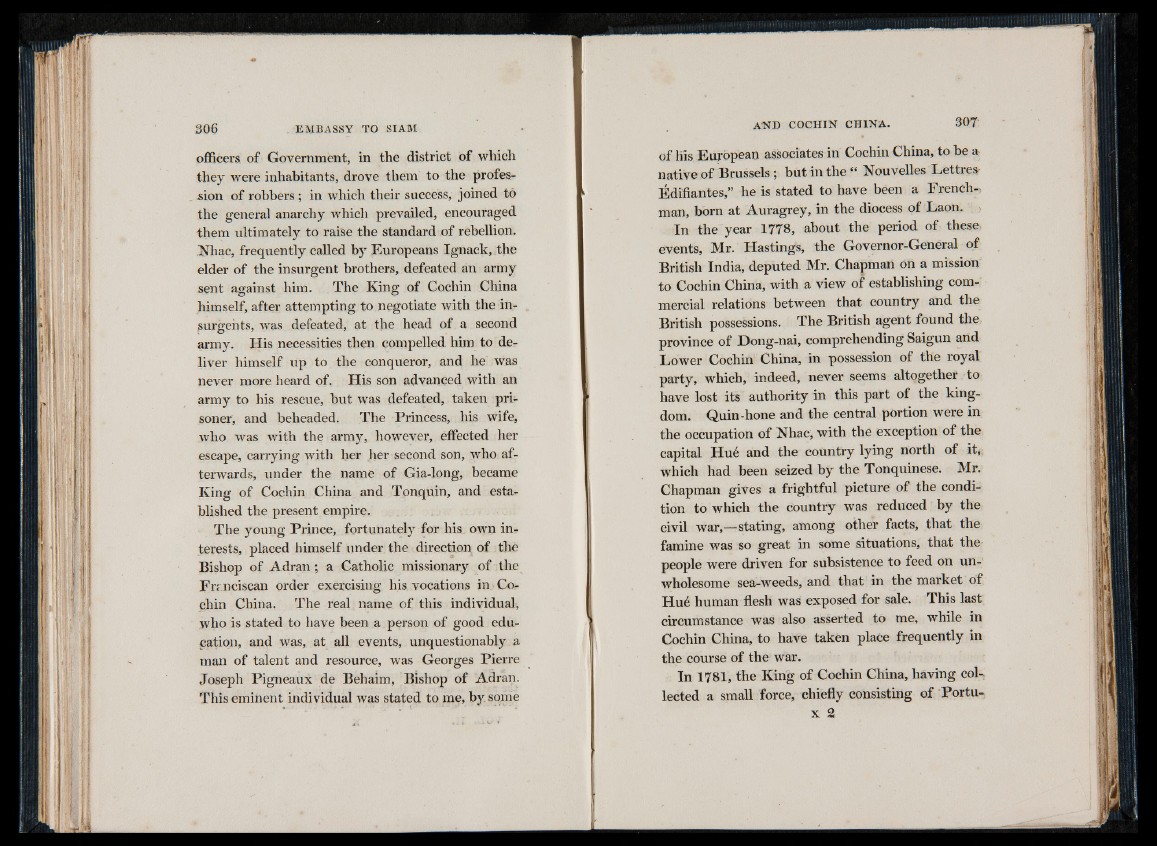
officers of Government, in the district of which
they were inhabitants, drove them to the profession
of robbers; in which their success, joined to
the general anarchy which prevailed, encouraged
them ultimately to raise the standard of rebellion.
Nhac, frequently called by Europeans Ignack,,the
elder of the insurgent brothers, defeated an army
sent against him. The King of Cochin China
himself, after attempting to negotiate with the insurgents,
was defeated, at the head of a second
army. His necessities then compelled him to deliver
himself up to the conqueror, and he was
never more heard of. His son advanced with an
army to his rescue, but was defeated, taken prisoner,
and beheaded. The Princess, his wife,
who was with the army, however, effected her
escape, carrying with her her second son, who afterwards,
under the name of Gia-long, became
King of Cochin China and Tonquin, and established
the present empire.
The young Prince, fortunately for his own interests,
placed himself under the direction of the
Bishop of A d ran ; a Catholic missionary of the
Franciscan order exercising his vocations in Cochin
China. The real name of this individual,
who is stated to have been a person of good education,
and was, at all events, unquestionably a
man of talent and resource, was Georges Pierre
Joseph Pigneaux de Behaim, Bishop of Adran.
This eminent individual was stated to me, by some
of his European associates in Cochin China, to be a
native of Brussels ; but in the “ Nouvelles Lettres
Édifiantes,” he is stated to have been a Frenchman,
born at Auragrey, in the diocess of Laon.
In the year 1778, about the period of these
events, Mr. Hastings, the Governor-General of
British India, deputed Mr. Chapman on a mission
to Cochin China, with a view of establishing commercial
relations between that country and the
British possessions. The British agent found the
province of Dong-nai, comprehending Saigun and
Lower Cochin China, in possession of the royal
party, which, indeed, never seems altogether to
have lost its authority in this part of the kingdom.
Quin-hone and the central portion were in
the occupation of Nhac, with the exception of the
capital Hué and the country lying north of it*
which had been seized by the Tonquinese. Mr.
Chapman gives a frightful picture of the condition
to which the country was reduced by the
civil war,—stating, among other facts, that the
famine was so great in some situations, that the-
people were driven for subsistence to feed on unwholesome
sea-weeds, and that in the market of
Hué human flesh was exposed for sale. This last
circumstance was also asserted to me, while in
Cochin China, to have taken place frequently in
the course of the war.
In 1781, the King of Cochin China, having collected
a small force, chiefly consisting of Portux
2